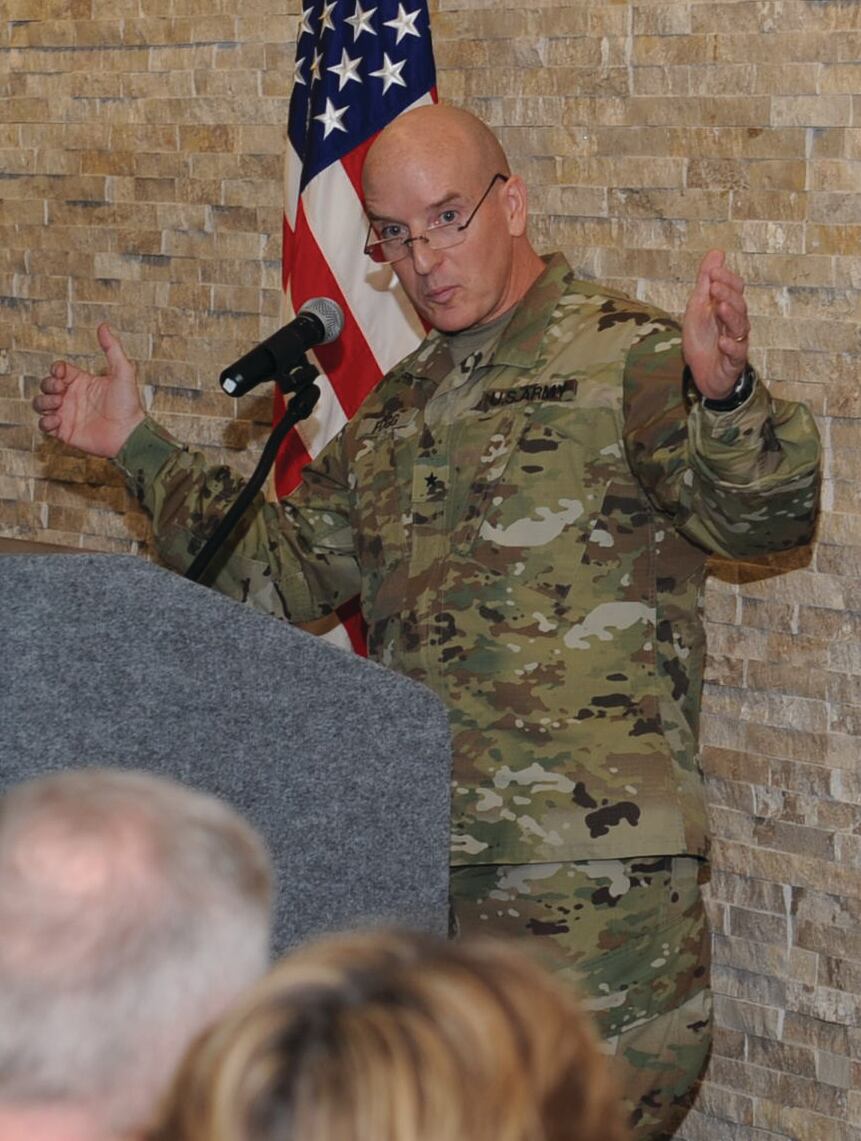The new head of the Quartermaster Corps wants to ensure his soldiers not only know their specialties, but can go beyond that skill set as combat-ready leaders.
"We produce warrior-logisticians as much as we can," said Brig. Gen. Rodney Fogg, who took over June 10 as the 54th quartermaster general. The job also includes oversight of the Quartermaster School in Fort Lee, marking the officer's fifth assignment to the Virginia installation in a 29-year career.
His previous assignment, as commanding general of 13th Sustainment Command out of Fort Hood, Texas, included time in the Middle East that reminded him of the need for hard-charging quartermasters who can operate outside their comfort zones, when called upon.
Days into a deployment that was supposed to offer assistance with the Afghanistan pullout, "our focus changed to Operation Inherent Resolve, and what was going on in Iraq," Fogg said. "Soldiers, I'm not exaggerating, would work from 5 in the morning on the staff until 11, midnight, maybe longer, to make things happen. And while they would come there as quartermaster soldiers and warrant officers, experienced with maybe warehousing, they needed to quickly learn how to be supply-chain managers. They needed to learn how to bring strategic logistics from operations to tactical.
Tens of thousands of soldiers complete training at the school yearly, Fogg said, with enlisted quartermasters joining one of 10 MOSs ranging from parachute rigging to food services to refueling and logistical support. Nearly every Army unit has a quartermaster – many of whom hold more sway than leaders realize.
One example: While Global Combat Support System-Army is a billion-dollar, high-level system designed to track more than $200 billion in Army assets, "often, the people who are running that are junior enlisted soldiers," Fogg said. "They're the ones in the motor pools, the supply rooms, … and often, that means they are responsible for 15, maybe 20 percent of a unit's purse strings."
More from Fogg, who sat down for a wide-ranging interview with Army Times about a month after taking his new position atop the Quartermaster Corps, which has supplied and supported the Army as a whole, in various roles, since its formation as the Quartermaster Department on June 16, 1775 — two days after the Army's birth:
Training aides: Fogg praised the use of downloadable applications for some quartermaster MOSs as a way to speed up young soldiers' learning curves while refreshing those of Quartermaster Corps members long out of school.
In one setup for aviation refuelers, "you would see helicopters fly in virtually," Fogg said. "They would land … you'd be set up step-by-step, and if you mess up a step, you won't be allowed to continue. You'd have to have all the equipment, have it hooked up to the tankers, have all the fuel flowing through."
The apps allows soldiers in training to cement their skills via virtual repetitions. They're also an example of what Fogg's top enlisted leader, Command Sgt. Maj. Jimmy Sellers, called "reach-back capability."
"Having that app access on their phone, they can kind of reach out and touch it any time they want to – find out new things we've got going on here [at the Quartermaster School] in terms of doctrine," said Sellers, a 26-year soldier. "They're able to access that at a moment's notice."
Battling the drawdown: The Quartermaster Corps likely will suffer cuts along with the rest of the Army, but "I don't see us taking any larger slice than anybody else," Fogg said.
"The Army's transforming, transitioning, reshaping," he continued. "What we've got to do is concentrate on training our soldiers. If we're going to be a smaller Army, we have to make sure that Army is highly trained and very well-equipped."
Keeping up on all fronts: The Quartermaster School's offerings must match the needs of the Army while its methods match the learning style of its students, Fogg said.
The school stopped teaching clothing repair in early 2015, although sewing's still on the menu for parachute riggers. The move allowed students more time to learn a laundry system, the Army said in a news release.
"As technology continues to roll and as materials change, our MOSs will change with it," Fogg said. "[We have to be] changing with the Army, and having our ear to the rail to what's going on with the operational Army – changing with the times."
Kevin Lilley is the features editor of Military Times.





